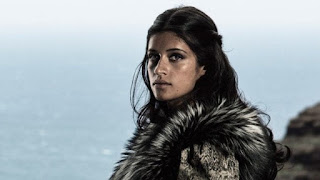I wanted to write this whole thing about how sometimes the determined attempt to make your movie/show appeal to the largest amount of people (in order to make the most money) works to the detriment of the product in question and how movies/shows that are made with more freedom are better. Then I realized, however, that I touched on this issue in a previous post and that other people have written enough about it. So instead of a nuanced comment, have this meme:
I love fictional stories, be they in the form of novels, TV shows, or movies. I love to immerse myself in their worlds and often I come away with feelings, thoughts, and opinions. And what better way to share them than on the internet?
Sunday, March 8, 2020
Monday, March 2, 2020
Game of Thrones, The Witcher and genre fiction
So. To be clear, this is not meant to complain about GoT and in turn praise The Witcher, because I genuinely did love GoT and The Witcher also only has one season right now, so there's still ample time for Netflix to mess it up real badly. Instead, it is an examination of the fantasy genre and how these shows embody or don't embody it (for the purpose of this post I’ll just compare the show incarnations and disregard the novels and games). I am also not the first person to write about GoT's relationship to the genre (see, for example, this NYTimes article), so I'll be concentrating on The Witcher a bit more.
People like The Witcher. According to google 95% of viewers liked it, its imdb rating is 8.3 and its rotten tomatoes audience score is 92%. There are a multitude of covers and remixes of “Toss a coin to your witcher” on youtube and immediately there were loud calls for a second season. As obvious as its success seems today, it wasn’t so clear before. Most people were familiar with The Witcher from the games and not the novels and video game adaptations are notoriously ill-fated. People were unhappy with Henry Cavill’s casting and the first images of him in costume were widely ridiculed. When the show was announced in 2017, Game of Thrones was still much beloved and seemed to set the standard not only for fantasy TV but for quality TV for years to come. Everything, so it seemed then, would be measured against GoT and inevitably found lacking.
And then it came different.
I am convinced that The Witcher would not have become so popular so fast, had a large amount of people not been extremely disappointed by GoT (there’s an ongoing petition to remake season 8 with, at time of writing, 1.8 million supporters). Now, the two are very different, of course, from their conceptualization and narrative structure to their content, setting, and themes. They do, however, belong to the same rough genre, that genre being (dark) fantasy.
Fantasy is, among other things, concerned with a society’s relationship to magic and the metaphyiscal powers and how that relationship changes or evolves. It deals with questions like what does the existence of magic/magical beings mean for a society, how does it shift power balances, inhowfar does it inform the structure of society and people’s everyday lives and belief systems. As already implied, politics is, also, a significant aspect of a lot of fantasy stories. The alternate world is examined and its political structures embedded in the fantastical context reflect familiar structures. As Ross Douthat, from the NYTimes article, concludes: “thus fantasy villains are sometimes fusions of premodern and postmodern forces — the demonic industrialist Saruman in Tolkien, the technological deities in Neil Gaiman’s “American Gods,” even Martin’s White Walkers, part Faerie and part climate change”.
GoT - the show - obviously and purposefully stripped the story of quite a bit of its fantasy elements. The showrunners famously said that they didn’t want to create genre fiction and instead wanted to appeal to a mainstream audience (see, for example, this Independent article). Therefore, they concentrated on the political intrigue and the fights, strife, and struggles of the characters. Many (for example, this dude*) cite this decision as one of the main reasons for GoT’s success. This decision did, however, pose the challenge of how to adapt the more classic fantasy elements not only present in but central to the narrative of the source material. Thus, characters ended up deprived of their motivation and depth and story arcs ended up not fulfilling their purpose.
The Witcher on the other hand is unapologetically fantasy. It does nothing to slowly accustom the viewer to its world and the magic within. In the first episode there’s a dramatic battle, Geralt (Henry Cavill) fights a monster which makes his eyes go black, and meets a shady sorcerer in a bigger on the inside tower. In the next episode the audience starts to follow Yennefer (Anya Chalotra) through her sorcery-school while Geralt picks up a bard and a princess (Freya Allan) runs for her life. The show does not bother to explain that all these happen in wildly different decades, it trusts that the viewer understands from context clues. That this world is teeming with magic, curses, potions, elves, monsters, magical beings and sorcerers is a given, as is the existence of various kingdoms and the struggles between them.
And that is what makes it enjoyable. It is clearly and unselfconsciously genre fiction, relying on and remixing true and tried fantasy tropes and elements. It explores the different relationships the three protagonists have to magic and society and works towards a central conflict that is going to dominate the narrative going forward.
The Witcher might, therefore, not appeal to an audience wholly uninterested in fantasy, but as its popularity shows, fantasy appeals to the mainstream.
Over and out.
*His opinion is mostly included as a counter-opinion to what I'm trying to argue (I disagree with almost everything he says), so you can check out other opinions as well. Be warned, though, his assessment of the GoT finale critics is just a tad insulting.
People like The Witcher. According to google 95% of viewers liked it, its imdb rating is 8.3 and its rotten tomatoes audience score is 92%. There are a multitude of covers and remixes of “Toss a coin to your witcher” on youtube and immediately there were loud calls for a second season. As obvious as its success seems today, it wasn’t so clear before. Most people were familiar with The Witcher from the games and not the novels and video game adaptations are notoriously ill-fated. People were unhappy with Henry Cavill’s casting and the first images of him in costume were widely ridiculed. When the show was announced in 2017, Game of Thrones was still much beloved and seemed to set the standard not only for fantasy TV but for quality TV for years to come. Everything, so it seemed then, would be measured against GoT and inevitably found lacking.
And then it came different.
I am convinced that The Witcher would not have become so popular so fast, had a large amount of people not been extremely disappointed by GoT (there’s an ongoing petition to remake season 8 with, at time of writing, 1.8 million supporters). Now, the two are very different, of course, from their conceptualization and narrative structure to their content, setting, and themes. They do, however, belong to the same rough genre, that genre being (dark) fantasy.
Fantasy is, among other things, concerned with a society’s relationship to magic and the metaphyiscal powers and how that relationship changes or evolves. It deals with questions like what does the existence of magic/magical beings mean for a society, how does it shift power balances, inhowfar does it inform the structure of society and people’s everyday lives and belief systems. As already implied, politics is, also, a significant aspect of a lot of fantasy stories. The alternate world is examined and its political structures embedded in the fantastical context reflect familiar structures. As Ross Douthat, from the NYTimes article, concludes: “thus fantasy villains are sometimes fusions of premodern and postmodern forces — the demonic industrialist Saruman in Tolkien, the technological deities in Neil Gaiman’s “American Gods,” even Martin’s White Walkers, part Faerie and part climate change”.
GoT - the show - obviously and purposefully stripped the story of quite a bit of its fantasy elements. The showrunners famously said that they didn’t want to create genre fiction and instead wanted to appeal to a mainstream audience (see, for example, this Independent article). Therefore, they concentrated on the political intrigue and the fights, strife, and struggles of the characters. Many (for example, this dude*) cite this decision as one of the main reasons for GoT’s success. This decision did, however, pose the challenge of how to adapt the more classic fantasy elements not only present in but central to the narrative of the source material. Thus, characters ended up deprived of their motivation and depth and story arcs ended up not fulfilling their purpose.
The Witcher on the other hand is unapologetically fantasy. It does nothing to slowly accustom the viewer to its world and the magic within. In the first episode there’s a dramatic battle, Geralt (Henry Cavill) fights a monster which makes his eyes go black, and meets a shady sorcerer in a bigger on the inside tower. In the next episode the audience starts to follow Yennefer (Anya Chalotra) through her sorcery-school while Geralt picks up a bard and a princess (Freya Allan) runs for her life. The show does not bother to explain that all these happen in wildly different decades, it trusts that the viewer understands from context clues. That this world is teeming with magic, curses, potions, elves, monsters, magical beings and sorcerers is a given, as is the existence of various kingdoms and the struggles between them.
And that is what makes it enjoyable. It is clearly and unselfconsciously genre fiction, relying on and remixing true and tried fantasy tropes and elements. It explores the different relationships the three protagonists have to magic and society and works towards a central conflict that is going to dominate the narrative going forward.
The Witcher might, therefore, not appeal to an audience wholly uninterested in fantasy, but as its popularity shows, fantasy appeals to the mainstream.
Over and out.
*His opinion is mostly included as a counter-opinion to what I'm trying to argue (I disagree with almost everything he says), so you can check out other opinions as well. Be warned, though, his assessment of the GoT finale critics is just a tad insulting.
Subscribe to:
Comments (Atom)
About Me

- Satori
- I am in my early 30s and finished my university career. My areas of study included media analysis, literary and cultural studies, linguistics, and history. I like reading, drawing, writing, movies, TV, friends, traveling, dancing and all kinds of small things that make me happy. Just trying to spread some love.
Favorite quotes of 2025
This year, before I give you my rundown of best books read in 2025, I give you my favorite quotes in no particular order. These are just a s...
-
As another collection from the novels I read last year, I present to you some of my favorite quotes. They are my favorite either because the...
-
Hey now, has this ever happened to you? You are innocently scrolling social media, looking at memes, cute animal videos and the occasional ...
-
I don't want to be so mean on my blog and generally I have positive things to say about the novels I read since I know that just because...



